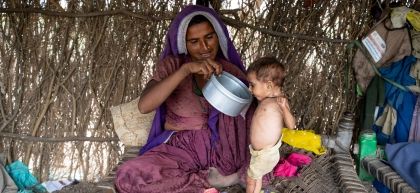
Read our 2022 annual report

Knowledge Hub
Tough talk at the UN on sustainable development
Against a backdrop of unprecedented global humanitarian needs, there was tough talk at the UN this week on delivering on the world’s promise to the poorest and most vulnerable.
At the UN High level Political Forum on Sustainable Development in New York this week, there was a sense of urgency that is rare at these kinds of events. With new leadership at the helm and a growing sense of impatience as the clock ticks towards 2030, polite protocol was put aside in favour of strong messages, delivered to the nations of the world.
UN Secretary General Antonio Gutteres spelt out what needs to happen, not least in the area of conflict, which is the root of so much human suffering. He also urged a new perspective on migration - based not on rejection but on rights and on reforming the UN system itself.
Development economist Jeffrey Sachs pulled no punches in his keynote address calling out nations that priortise arms trading over human security, an oil industry that continues to eviscerate the environment, and individual member states that have failed to act on their commitment to the Sustainable Development Goals (SDGs).
Progress – but not fast enough
The theme of this year’s meetings was ‘Eradicating poverty and promoting prosperity in a changing world’ and though the tone was forthright, the High Level Panel in New York was as much about the possible, shining a light on what has been achieved at a global level. Two years into implementing the Goals, and only thirteen to go, the Secretary General’s report on progress towards the Goals shows that dramatic advances have been made in recent years in areas such as alleviating extreme poverty, reducing hunger and malnutrition, and improving child and maternal health.
The record shows clearly that when significant resources are invested, and concerted efforts are made, seismic change can occur and extreme challenges in global development can be met. However, the pace of change has not been fast enough, particularly in the areas of peace and conflict, climate change and the environment.
Regional inequalities
Progress has also varied considerably depending on the region. While Sweden, Denmark and Finland have made the greatest strides in working towards the Goals, progress among developing nations continues to falter. Ireland ranks nineteenth overall, performing well on poverty eradication and national wellbeing, but other indicators including climate change and the environment are very mixed.
The meetings in New York this week are mile markers in a marathon, essential for tracking progress on the journey towards achieving the overall goals. But in recent years, the severity of our collective global challenges has increased dramatically. The fierce effects of conflict and climate change have intensified, societal inequality has deepened and food insecurity has worsened. This marathon has now become a race against time.
Leaving no-one behind
‘Leaving no-one behind’ is the fundamental underlying principle of the SDGs but for those who are most often left behind, the direct effects of these most severe global challenges are already being felt. Conflict, climate change and deepening inequality are mutually reinforcing, with the effects of one often compounding the impact of another, particularly on the poorest and the most vulnerable.
Right now in East Africa this cycle is painfully evident, as the combined effects of conflict and drought have created an unprecedented humanitarian crisis where 25 million people are threatened with famine and starvation. On the first day of the conference, the UN Office for the Coordination of Humanitarian Affairs reported that only 43 percent of the $6.27 billion needed to prevent widespread famine this year in Yemen, Somalia, South Sudan and Nigeria had been raised.
The SDGs are not only about the future, they are about addressing the problems of today. There are many questions as to how the SDGs will be achieved, but perhaps the most pressing one is: if we are failing to tackle the unmet humanitarian needs of millions of people today, how will we ever live up to our promises for the future?
Concern CEO Dominic MacSorley attended the 2017 High Level Panel on Sustainable Development on behalf of Coalition 2030, an alliance of leading civil society groups working for the achievement of the United Nations Sustainable Development Goals by 2030.
Find out more
Follow Dominic MacSorley on Twitter.


